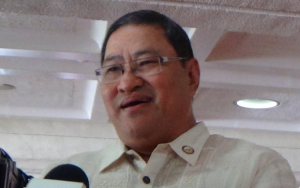MANILA, Philippines–The House energy committee is leaning toward granting President Aquino the special powers he has requested to deal with an impending power crisis next year, but to allow him to exercise such powers for no more than three to four months.
“This is because after the summer of 2015, there will no longer be a power shortage since the new plants will start to be commissioned. It just so happened that these new capacities would not be available for the summer of 2015,” said Oriental Mindoro Rep. Reynaldo Umali, the committee chair.
Umali said he expected Congress to approve the joint resolution which would empower the President to secure additional generating capacity.
He said most of the committee members are amenable to giving the President emergency powers, as provided for by Section 71 of the Electric Power Industry Reform Act (Epira).
Unnecessary
But ACT Teachers party-list representative Antonio Tinio said that this was news to the Makabayan bloc which has opposed the granting of emergency powers to avert a threatened power crisis next year, arguing that it was not necessary.
In the request for special powers that he submitted last Sept. 12 , the President merely cited the Department of Energy’s expectations of a “critical electricity situation” next summer due to the El Niño phenomenon; shutdown of the Malampaya power plant from March to April next year, delays in the commissioning of new power plants and breakdowns in other power suppliers.
He did not make any specifications on the extent of the special powers he was seeking as he left it to Congress and Energy Secretary Jericho Petilla to thresh it out.
Restricted powers
Umali said that since the power shortage was expected only during the summer months, the President’s special powers should only be restricted to within this period.
“It could go four months if Secretary Petilla would show us that the shortage would extend up to June. “This is the reason why we have to define the period so it will be clear to all,” he said.
The New York-based think tank Global Source said it was imperative to have a “well-studied, time-bound resolution, clearly defining the parameters of the authority granted to the Chief Executive that leaves little room for perceptions of abuse of powers to arise.”
The DOE and Congress are divided on how best to deal with the projected 600-megawatt deficit—whether through the interruptible load program (ILP) that aggregates private companies’ self-generating capacities or by getting excess capacity of existing power players on a short-term basis.
Umali said he expects the Senate to send its draft resolution on the requested special powers when Congress resumes sessions on Oct. 20.
He is confident the resolution will be approved before Congress goes into another brief recess in the first week of November.
